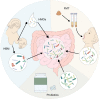Determinants of microbial colonization in the premature gut
- PMID: 37407941
- PMCID: PMC10324143
- DOI: 10.1186/s10020-023-00689-4
Determinants of microbial colonization in the premature gut
Abstract
Abnormal microbial colonization in the gut at an early stage of life affects growth, development, and health, resulting in short- and long-term adverse effects. Microbial colonization patterns of preterm infants differ from those of full-term infants in that preterm babies and their mothers have more complicated prenatal and postnatal medical conditions. Maternal complications, antibiotic exposure, delivery mode, feeding type, and the use of probiotics may significantly shape the gut microbiota of preterm infants at an early stage of life; however, these influences subside with age. Although some factors and processes are difficult to intervene in or avoid, understanding the potential factors and determinants will help in developing timely strategies for a healthy gut microbiota in preterm infants. This review discusses potential determinants of gut microbial colonization in preterm infants and their underlying mechanisms.
Keywords: Antibiotics; Delivery mode; Dysbiosis; Gut microbiota; Human breast milk; Microbial colonization; Preterm infant; Probiotics.
© 2023. The Author(s).
Conflict of interest statement
The authors declare that they have no competing interests.
Figures




Similar articles
-
FEEDMI: A Study Protocol to Determine the Influence of Infant-Feeding on Very-Preterm-Infant's Gut Microbiota.Neonatology. 2019;116(2):179-184. doi: 10.1159/000496547. Epub 2019 May 27. Neonatology. 2019. PMID: 31132782
-
Necrotizing Enterocolitis and the Preterm Infant Microbiome.Adv Exp Med Biol. 2019;1125:25-36. doi: 10.1007/5584_2018_313. Adv Exp Med Biol. 2019. PMID: 30680646 Review.
-
A systematic review of the factors influencing microbial colonization of the preterm infant gut.Gut Microbes. 2021 Jan-Dec;13(1):1-33. doi: 10.1080/19490976.2021.1884514. Gut Microbes. 2021. PMID: 33818293 Free PMC article.
-
Perinatal Antibiotic Exposure Affects the Transmission between Maternal and Neonatal Microbiota and Is Associated with Early-Onset Sepsis.mSphere. 2020 Feb 19;5(1):e00984-19. doi: 10.1128/mSphere.00984-19. mSphere. 2020. PMID: 32075882 Free PMC article.
-
Prenatal and postnatal antibiotic exposure influences the gut microbiota of preterm infants in neonatal intensive care units.Ann Clin Microbiol Antimicrob. 2018 Mar 19;17(1):9. doi: 10.1186/s12941-018-0264-y. Ann Clin Microbiol Antimicrob. 2018. PMID: 29554907 Free PMC article.
Cited by
-
Intestinal Microbiota in Early Life: Latest Findings Regarding the Role of Probiotics as a Treatment Approach for Dysbiosis.Nutrients. 2025 Jun 21;17(13):2071. doi: 10.3390/nu17132071. Nutrients. 2025. PMID: 40647176 Free PMC article. Review.
-
Factors influencing C-reactive protein status on admission in neonates after birth.BMC Pediatr. 2024 Feb 1;24(1):89. doi: 10.1186/s12887-024-04583-8. BMC Pediatr. 2024. PMID: 38302903 Free PMC article.
-
Digging deeper into necrotizing enterocolitis: bridging clinical, microbial, and molecular perspectives.Gut Microbes. 2025 Dec;17(1):2451071. doi: 10.1080/19490976.2025.2451071. Epub 2025 Jan 18. Gut Microbes. 2025. PMID: 39826099 Free PMC article. Review.
-
The Influences of Oral Probiotics on the Immunometabolic Response During Pregnancy and Lactation: A Systematic Review.Nutrients. 2025 Apr 30;17(9):1535. doi: 10.3390/nu17091535. Nutrients. 2025. PMID: 40362845 Free PMC article.
-
Changes in Gut Microbiota at 1-60 Days in 92 Preterm Infants in a Neonatal Intensive Care Unit Using 16S rRNA Gene Sequencing.Med Sci Monit. 2023 Nov 29;29:e941560. doi: 10.12659/MSM.941560. Med Sci Monit. 2023. PMID: 38018034 Free PMC article.
References
Publication types
MeSH terms
Substances
LinkOut - more resources
Full Text Sources
Medical

